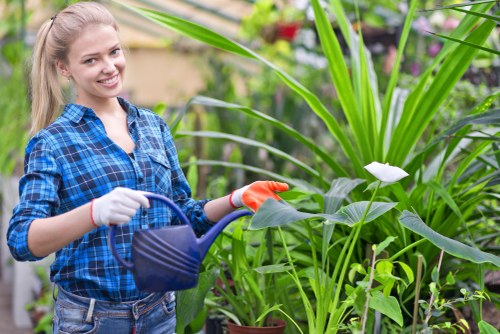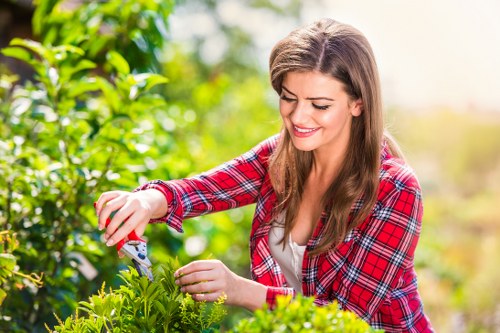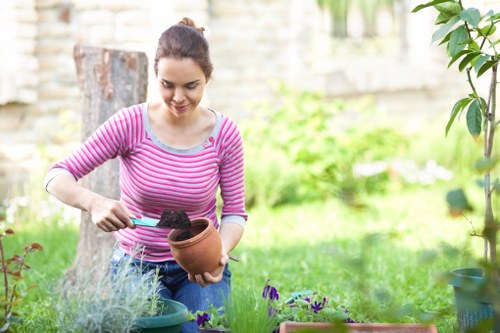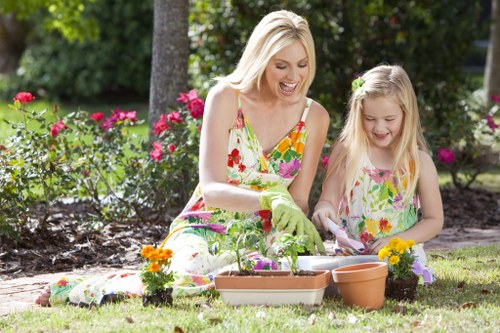Landscape Gardening in Norwood
Introduction to Landscape Gardening

Landscape gardening in Norwood is an art form that combines aesthetics, functionality, and sustainability to create outdoor spaces that are both beautiful and practical. Whether you’re a homeowner looking to enhance your backyard or a business owner aiming to improve the curb appeal of your property, professional landscape gardening services can transform your vision into reality.
Norwood's unique climate and soil conditions offer a diverse palette for garden designs, allowing for a wide variety of plant species and design elements. From vibrant flower beds to serene water features, the possibilities are endless.
Understanding the fundamentals of landscape gardening is essential for creating a garden that not only looks stunning but also thrives year-round. This article delves into the key aspects of landscape gardening in Norwood, providing insights and tips to help you achieve your dream garden.
Benefits of Landscape Gardening in Norwood

Investing in landscape gardening brings numerous benefits, both aesthetic and environmental. Properly designed gardens can enhance the overall appearance of your property, increase its value, and create a welcoming atmosphere.
Moreover, a well-maintained garden contributes to environmental sustainability by promoting biodiversity, reducing carbon footprint, and improving air quality. Plants absorb carbon dioxide and release oxygen, making gardens a vital component of a healthy ecosystem.
Another significant benefit is the mental and physical health advantages associated with gardening. Spending time in a beautifully landscaped garden can reduce stress, improve mood, and provide a space for relaxation and recreation.
Key Elements of Effective Landscape Design

An effective landscape design is built upon several key elements: plant selection, hardscaping, water management, and lighting. Each of these components plays a crucial role in creating a harmonious and functional outdoor space.
Plant Selection
Selecting the right plants is fundamental to landscape gardening. Plants must be chosen based on their suitability to Norwood’s climate, soil conditions, and the specific microclimate of your garden. Incorporating a mix of perennials, annuals, shrubs, and trees can provide color, texture, and structure throughout the year.
Hardscaping Features
Hardscaping involves the use of non-living elements such as stone pathways, patios, decks, and retaining walls. These features add structure to your garden, facilitate movement, and create defined areas for various activities. Materials should be selected to complement the natural surroundings and ensure durability.
Water Management
Effective water management is essential for maintaining a healthy garden. This includes the installation of irrigation systems, rainwater harvesting, and proper drainage solutions. Sustainable water practices not only conserve resources but also prevent issues like waterlogging and soil erosion.
Designing for Different Seasons

Planning your landscape garden with seasonal changes in mind ensures that your garden remains vibrant and appealing all year round. Each season offers unique opportunities for showcasing different plants and garden features.
Spring
Spring is a time of renewal and growth. Planting spring-blooming flowers like tulips and daffodils can bring color and life to your garden after the dormant winter months.
Summer
During summer, focus on drought-tolerant plants and provide ample shade to keep your garden cool. Incorporating water features such as fountains or ponds can also help regulate temperature and add a soothing element to the space.
Autumn
Autumn brings rich colors and fallen leaves that can be used creatively in garden design. Planting fall-blooming shrubs and preparing the garden for winter ensures a smooth transition across seasons.
Winter
In winter, evergreen plants and ornamental grasses can maintain visual interest even when other plants lose their leaves. Adding decorative elements like garden lights and statues can also enhance the garden’s appearance during the colder months.
Sustainable Gardening Practices

Sustainability is a growing trend in landscape gardening, emphasizing eco-friendly practices that benefit both the environment and the gardener. Implementing sustainable techniques can reduce waste, conserve resources, and promote biodiversity.
Composting
Composting garden waste and kitchen scraps creates nutrient-rich soil, reducing the need for chemical fertilizers. It also minimizes the amount of waste sent to landfills, making it an environmentally responsible practice.
Native Plants
Using native plants in your garden supports local wildlife and requires less maintenance, as these plants are adapted to the local climate and soil conditions. They also help preserve the natural heritage of Norwood's ecosystem.
Rainwater Harvesting
Harvesting rainwater for irrigation reduces reliance on municipal water supplies and ensures that plants receive natural, chemical-free water. Installing rain barrels or a rainwater collection system can make this practice easy and effective.
Choosing the Right Professionals for Your Garden
Selecting experienced and knowledgeable landscape gardening professionals in Norwood is crucial for achieving the best results. Professional landscapers bring expertise in design, plant care, and project management, ensuring that your garden meets your expectations and thrives over time.
When choosing a landscaping company, consider their portfolio, customer reviews, and the range of services they offer. A reputable landscaper will work closely with you to understand your vision, budget, and specific needs, providing customized solutions that align with your goals.
Additionally, professional landscapers are equipped to handle challenges such as soil quality issues, pest management, and climate-related constraints, ensuring a resilient and sustainable garden.
Maintenance and Care for Your Landscape
Ongoing maintenance is essential for keeping your landscape garden in pristine condition. Regular tasks include pruning, mulching, weeding, and monitoring plant health.
Pruning helps maintain the shape and size of plants, encourages healthy growth, and prevents diseases. Mulching conserves moisture, suppresses weeds, and improves soil structure, contributing to the overall health of your garden.
Implementing a consistent maintenance schedule ensures that your garden remains vibrant and well-organized, allowing you to enjoy its beauty without the stress of overgrown or neglected plants.
Popular Plants for Norwood Gardens
Choosing the right plants is key to a successful landscape garden in Norwood. Native and regionally adapted plants are often the best choice, as they are more resilient and require less maintenance. Here are some popular options:
- Roses: Classic flowers that add color and fragrance.
- Hostas: Shade-tolerant plants with attractive foliage.
- Lavender: Aromatic and drought-resistant, ideal for sunny spots.
- Japanese Maple: Provides stunning foliage and structure as a focal point.
- Daylilies: Low-maintenance perennials that bloom profusely.
Incorporating a variety of plants that bloom at different times ensures continuous interest and color throughout the seasons, enhancing the visual appeal of your garden.
Designing for Function and Aesthetics
A successful landscape garden balances functionality with aesthetics. Consider how you will use the space and design accordingly.
- Outdoor Living Areas: Create spaces for relaxation and entertainment, such as patios, decks, and outdoor kitchens.
- Pathways: Design walking paths that guide visitors through the garden and connect different areas.
- Privacy Screens: Use hedges, fences, or trellises to create private zones and reduce noise.
- Lighting: Incorporate lighting to highlight features, improve safety, and extend the usability of the garden into the evening.
- Water Features: Add ponds, fountains, or waterfalls to introduce calming sounds and attract wildlife.
By thoughtfully designing each element, you can create a garden that is not only visually stunning but also functional and comfortable for daily use.
Integrating Technology in Landscape Gardening
Modern technology offers innovative solutions to enhance landscape gardening in Norwood. Smart irrigation systems, automated lighting, and garden monitoring tools can streamline maintenance and improve the efficiency of your garden.
Smart irrigation systems adjust watering schedules based on weather conditions and soil moisture levels, ensuring that plants receive the optimal amount of water. This not only conserves water but also promotes healthier plant growth.
Automated lighting systems can be programmed to illuminate your garden at specific times, enhancing the beauty of your landscape while providing security during the night. Additionally, garden monitoring tools can help track plant health, soil conditions, and pest activity, allowing for proactive maintenance.
Enhancing Biodiversity in Your Garden
Promoting biodiversity is a key aspect of sustainable landscape gardening. A diverse garden supports a variety of wildlife, including pollinators, birds, and beneficial insects, creating a balanced and thriving ecosystem.
Incorporate a mix of plant species, including flowering plants, shrubs, and trees, to provide habitat and food sources for different creatures. Installing birdhouses, insect hotels, and water sources can further attract and sustain wildlife.
Reducing the use of pesticides and opting for natural pest control methods also contributes to a healthier garden environment. Embracing biodiversity not only enhances the ecological value of your garden but also adds to its visual and sensory richness.
Seasonal Garden Maintenance Tips
Maintaining a landscape garden requires attention to seasonal changes. Each season presents unique challenges and opportunities for garden care.
Spring Maintenance
As the weather warms, it's time to prepare your garden for the growing season. Remove any winter debris, prune dead branches, and fertilize plants to encourage new growth. Planting spring bulbs and preparing garden beds can set the stage for a vibrant season.
Summer Maintenance
During the hot summer months, focus on watering, weeding, and pest control. Implementing mulch helps retain soil moisture and regulate temperature. Regularly checking for pests and diseases can prevent major issues and keep your garden healthy.
Autumn Maintenance
Autumn is the time to clean up fallen leaves, prune plants, and prepare your garden for winter. Planting autumn-blooming flowers and shrubs can add beauty to your garden as the seasons change. It's also a good time to divide perennials and transplant them as needed.
Winter Maintenance
In winter, protect your garden from harsh weather by adding mulch to plant beds and covering sensitive plants. Regularly monitor for any signs of frost damage and take necessary precautions to ensure your garden remains resilient. Planning for the next growing season during the quieter winter months can also be beneficial.
Creating a Sustainable Garden Ecosystem
A sustainable garden ecosystem focuses on creating a balanced environment that supports plant health, promotes biodiversity, and conserves resources. This approach minimizes the need for external inputs and fosters natural processes.
Companion Planting
Companion planting involves growing different plants together that benefit each other. For example, planting nitrogen-fixing legumes alongside nutrient-demanding vegetables can enhance soil fertility. Companion plants can also repel pests and attract beneficial insects.
Soil Health
Maintaining healthy soil is fundamental to a sustainable garden. Regularly adding organic matter, such as compost and mulch, improves soil structure, enhances nutrient content, and promotes beneficial microbial activity. Testing soil pH and adjusting it as needed ensures optimal conditions for plant growth.
Integrated Pest Management (IPM)
IPM is a holistic approach to pest control that combines biological, cultural, and mechanical methods to manage pests with minimal environmental impact. By monitoring pest populations and implementing targeted interventions, you can effectively control pests without relying heavily on chemical pesticides.
Enhancing Your Garden with Artistic Elements
Incorporating artistic elements into your landscape garden can elevate its aesthetic appeal and create a unique atmosphere. Artful additions can serve as focal points, add texture, and reflect your personal style.
Sculptures and Statues
Placing sculptures or statues strategically within your garden can create visual interest and highlight specific areas. Whether you prefer classical stone sculptures or modern metal art, these pieces can become statement features in your landscape.
Garden Ornaments
Ornaments such as decorative pots, fountains, and birdbaths add charm and personality to your garden. They can also attract wildlife, enhancing the ecological diversity of your outdoor space.
Artistic Plant Arrangements
Creative plant arrangements, such as topiary, living walls, and patterned planting beds, showcase the artistry of landscape gardening. These designs can add structure and form, making your garden both beautiful and intriguing.
Conclusion and Call-to-Action
Landscape gardening in Norwood offers a unique opportunity to transform outdoor spaces into beautiful, functional, and sustainable environments. By understanding the key elements of design, selecting appropriate plants, implementing sustainable practices, and maintaining your garden, you can create a space that enhances your property and provides enjoyment for years to come.
If you’re ready to embark on your landscape gardening journey, contact us today to discuss your vision and discover how our expert services can bring your dream garden to life. Book your service now and take the first step towards a stunning outdoor sanctuary.